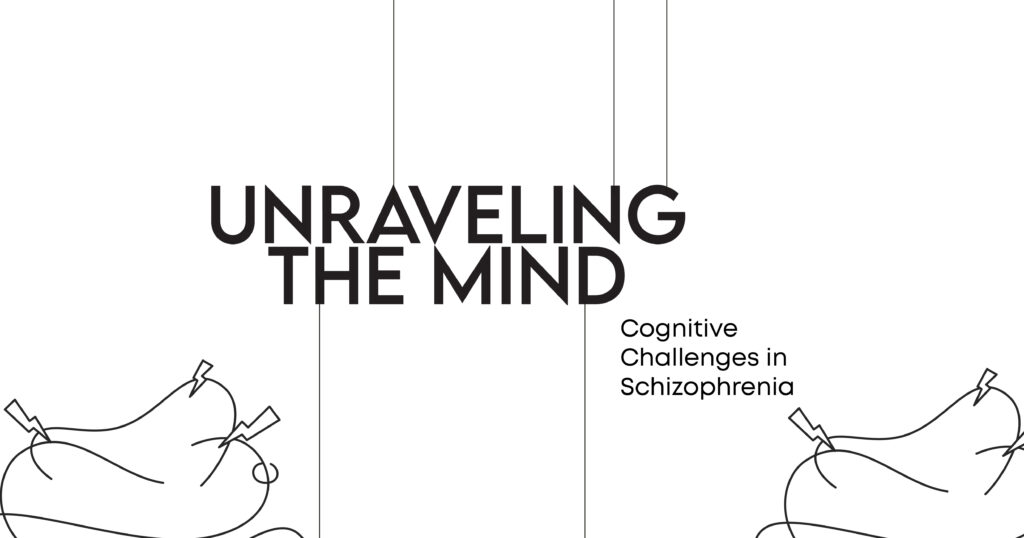It is easy to view schizophrenia in terms of its more observable symptoms – hallucinations, delusions, and disorganized behavior. But what is marginally more apparent, though significantly more effective, is that this disorder has cognitive symptoms of schizophrenia.
These are minor yet continual disabilities that influence the thinking processes, the memory, and the information processing of people. Although drugs and treatments can help in treating the psychotic symptoms, cognitive difficulties may persist, affecting everyday functions and interactions.
Understanding Cognitive Deficits and Their Impact
Cognitive impairments are the under-the-radar aspect of schizophrenia, which indirectly dictates how a victim relates to the world. These impairments are long-lasting, as opposed to the acute psychotic episodes, and are capable of manifesting themselves prior to the initial psychotic break. They influence a wide spectrum of mental functions – from memory and attention to reasoning and problem-solving. These impairments cause difficulties in learning, communication, and employment for a good number of people.
They may not be able to track conversations, get through complicated instructions, or stay focused in their day-to-day affairs. Cognitive impairment in schizophrenia is one of the strongest predictors of long-term disability, according to the National Institute of Mental Health NIMH. This observation underscores the fact that the treatment of schizophrenia is best achieved by considering the manifested and hidden parts of the disease.
Nashville Mental Health
Overview of Cognitive Deficits and Their Types
Schizophrenia has cognitive deficits that include a number of interrelated areas. Knowledge of these types enables clinicians and families to understand the affected people and assist them better. Below is a concise overview:
| Type of Cognitive Deficit | Description | Common Effects |
| Memory Impairment | Difficulty in recalling information or forming new memories. | Forgetfulness, inability to retain details. |
| Attention Dysfunction | Reduced capacity to focus or maintain concentration. | Distraction, incomplete tasks, confusion. |
| Executive Function Impairment | Problems with planning, organizing, or problem-solving. | Poor decision-making, lack of initiative. |
| Information Processing Deficit | Slowed ability to interpret or respond to stimuli. | Misunderstanding cues, delayed reactions. |
| Impaired Reasoning | Struggles with logical thinking or judgment. | Difficulty distinguishing reality from misperception. |
The cognitive impairments are not in isolation. Rather, they interrelate and compound each other such that most daily activities, such as cooking, driving, or even working, become extremely difficult to handle alone.

Exploring Memory Impairment and Its Consequences
One of the most conspicuous cognitive symptoms of schizophrenia is memory impairment. It is an impairment of both the short-term and working memory, which are crucial to daily functioning. When memory is impaired, even basic tasks – like remembering how to do something at work or where you left your keys – can become overwhelming.
Articles in the journal Frontiers in Psychiatry indicate that lack of memory is one of the initial symptoms of schizophrenia, and it generally persists even when the rest of the symptoms have been manifested. This can lead to isolation and frustration in a society where the individual would feel like they do not understand or are not able to comprehend.
Cognitive Remediation Therapy (CRT), working memory exercises, and such other therapeutic interventions have proven to hold the potential to address this challenge. They also intend to increase neural pathways because of systematic cognitive training, leading to progressive improvements in memory retention and recall.
The Role of Attention Dysfunction in Cognitive Decline
Attention dysfunction is a major determinant of the entire cognitive deterioration that is experienced in schizophrenia. People find it hard to maintain concentration in a conversation or even in an activity, and to effectively interact in everyday life. It may seem like a mental marathon, even when watching a movie or reading a book.
In a study conducted by the American Psychological Association (APA), attention-deficit in schizophrenia is attributed to the dysfunction of the prefrontal cortex in the brain, which is involved in attention and executive control. These neural abnormalities ensure that individuals cannot filter irrelevant stimuli, and so, cognitive overload is experienced.
Mental health professionals tend to combine both mindfulness-based attention training and systematic cognitive behavioral interventions to overcome these effects by assisting patients to refocus and better cope with disruptions.
Examining Executive Function Impairment
Executive function impairment is characterized by problems with planning, decision-making, problem-solving, and self-regulation. Such cognitive skills are extremely important in the independence of life, and their deterioration may considerably impact productivity and social adjustment.
- Difficulty initiating or completing multistep tasks.
- Poor organization and time management.
- Inability to adapt to changing circumstances.
- Struggles in prioritizing or making rational choices.
These limitations often manifest in the workplace or educational settings, where structure and adaptability are vital. Therapeutic interventions such as Goal Management Training (GMT) and occupational therapy can support individuals in developing structured routines and compensatory strategies.
Challenges in Information Processing and Thought Disorder
In discussing the problem of information processing in schizophrenia, we mean the way the brain processes and receives outside stimuli and reacts to them. A large number of people have reduced processing speed, which entails increased time to process or respond to data. Such latency could pose an obstacle to socialization, with answers seeming inappropriate or slow.
Combined with thought disorder, or disorganized or incoherent thinking, these difficulties can make people even more alienated. Individuals can switch between ideas that do not relate, speak in senseless language, or may not know how to remain on course. These symptoms may render communication between family members and caregivers challenging, which can create frustration on both ends.
Educational interventions and consistent therapeutic engagement can mitigate these symptoms over time. PsychologyToday offers supportive information for families learning to navigate these complexities.
Impaired Reasoning and Its Effects on Daily Life
The problem of impaired reasoning in schizophrenia influences the capacity of an individual to comprehend reality and make reasonable judgments. Such a void adds to the problem of trying to differentiate reality and perception. This can therefore make people make irrational conclusions and misunderstand social signals, which will result in confusion and possible confrontation.
An instance is that one may easily think that two unrelated events are related or be suspicious of individuals with no proof. The fact that these distorted thought patterns destroy not only cause distress but also promote social withdrawal is further supported. Psychotherapy, specifically,
Cognitive Behavioral Therapy for Psychosis (CBTP), has been found useful in assisting them to reevaluate and redefine these distorted beliefs. It helps in enhanced reasoning and reality testing when used together with medication and psychoeducation.
Nashville Mental Health
Comprehensive Schizophrenia Care at Nashville Mental Health
At Nashville Mental Health, we realize that the cognitive symptoms of schizophrenia cannot be treated only with the use of symptom control, but it is necessary to provide the mental, emotional, and cognitive restitution holistically. Our psychiatrists, psychologists, and therapists offer a participative strategy that involves comprehensive treatment planning.
Our goal is to empower individuals to reclaim their cognitive functioning, rebuild confidence, and reintegrate meaningfully into their communities. Every treatment plan is tailored to meet personal strengths and challenges, ensuring compassionate, evidence-based care. If you or a loved one is struggling with the cognitive challenges of schizophrenia, reach out to Nashville Mental Health. Our dedicated team is here to guide you toward clarity, stability, and improved mental wellness.

FAQs
What are common cognitive deficits associated with schizophrenia?
Such common deficits can be memory impairment, attention dysfunction, executive function impairment, impaired reasoning, and difficulties with information processing. These shortcomings have the potential to disrupt learning, problem-solving, and socialization.
How does memory impairment affect individuals with schizophrenia in their daily lives?
Memory issues cause challenges in remembering something or in following instructions, which may pose a lot of confusion, frustration, or even dependency on others to be assisted in their day-to-day activities.
In what ways does attention dysfunction contribute to cognitive decline in schizophrenia?
Attention dysfunction interferes with attention and concentration, and it becomes hard to remain involved in activities, acquire new skills, or cope with conversations successfully.
How does executive function impairment impact decision-making in people with schizophrenia?
It disrupts the capacity to plan, prioritize, and make sensible decisions and causes problems in failing to stick to routines or adjust to the changes in life.
Nashville Mental Health
What strategies can help manage thought disorder and impaired reasoning in schizophrenia?
Thinking skills may be enhanced by cognitive behavioral therapy, structured rehabilitation programs, or psychoeducation to teach people to identify their distorted thoughts or distortions of perception.





